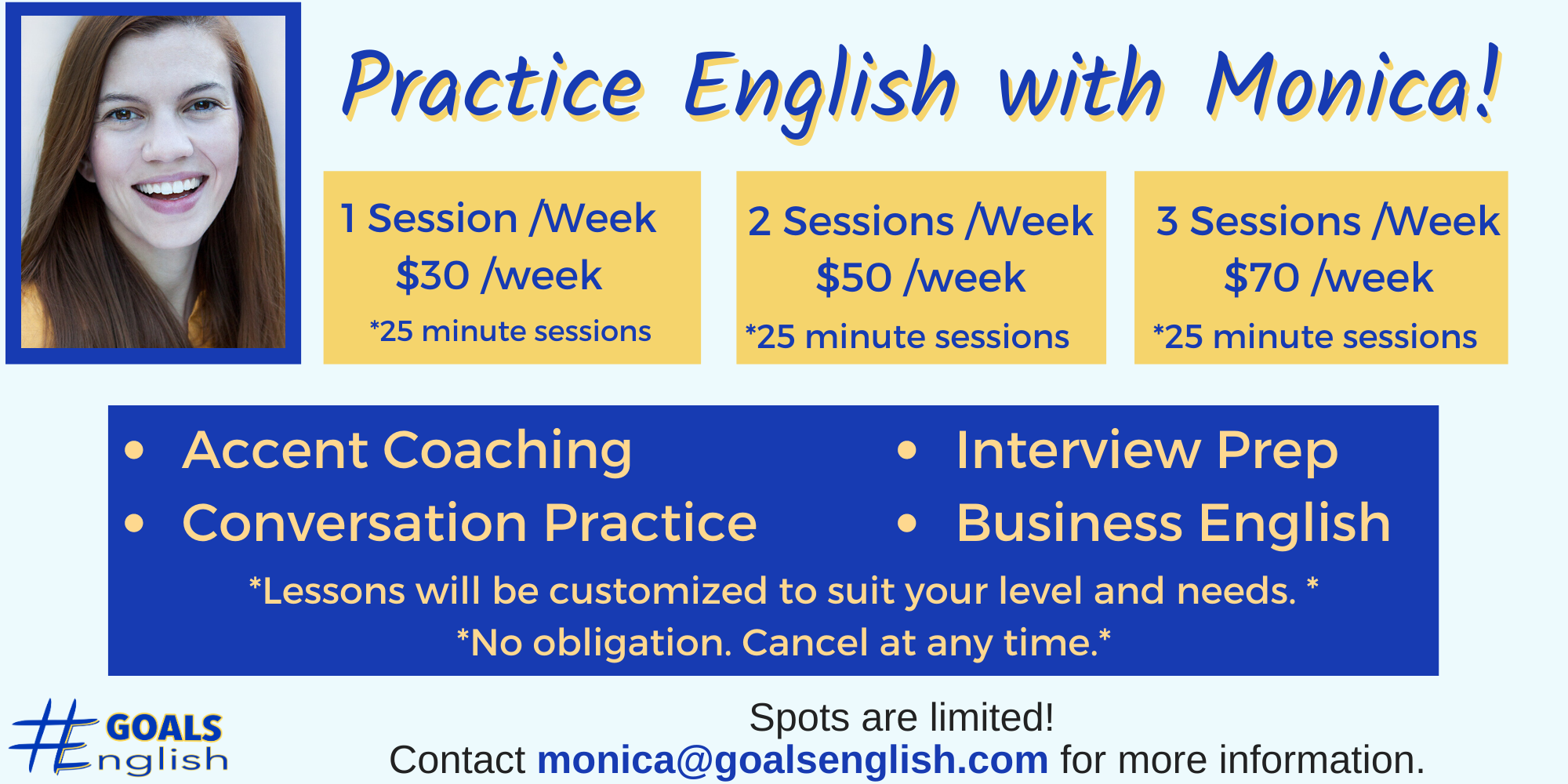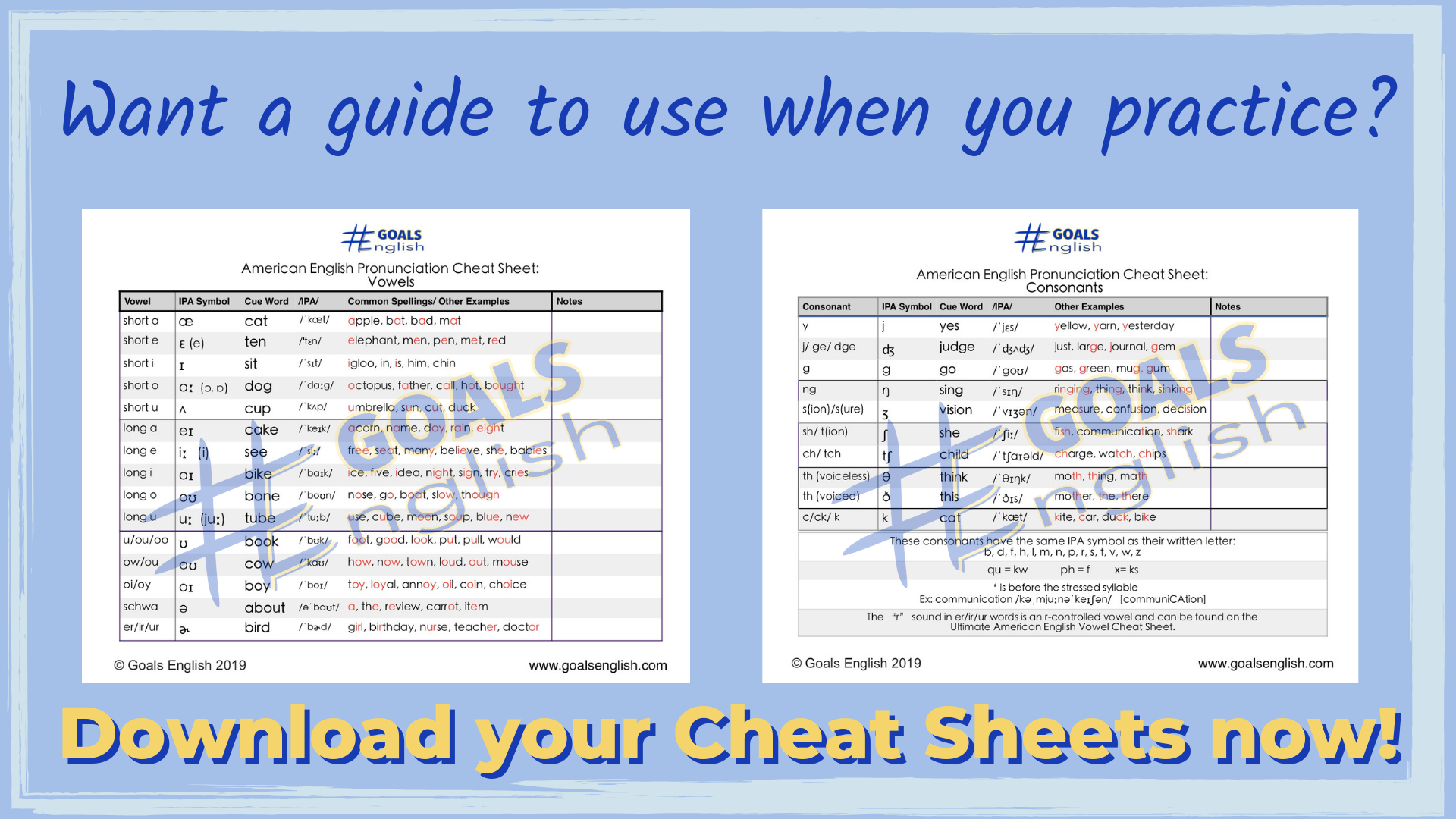If you are an adult English learner, like many of my students, it’s very likely you are struggling to improve your accent when speaking English. Sometimes, even students who learned English as a child have trouble with the finer points of pronunciation and carry those difficulties into adulthood. Why is that? In this blog post I’m going to go over some of the reasons that your accent in English may not be improving, even if you practice a lot! But first…
Story Time!
I once had a French teacher in college who was actually German. He learned French at 21 and had a PERFECT ACCENT. No really. On a trip to France, the French people he met thought he was actually French. I listened in awe as he explained the finer points of the French accent versus German, and he was always very strict about our French pronunciation. I studied Spanish all through high school, but he was the first teacher who ever paid specific attention to pronunciation and I LOVED IT. He opened my eyes to the fact that pronunciation needs to be taught simultaneously right from the beginning of learning a language.
The funny thing about this teacher with a perfect French accent was, however, that he had a German accent in English even though he learned it as a child. This kind of blows away the idea that only kids learning a language before the age of 11 can have a perfect accent. The truth is it’s way more complicated than that.
So why did he have an accent in English even though he had been speaking it longer than French? The simple answer is that all of his English teachers growing up had German accents. He learned English with an accent right from the beginning. Trying to change an accent later is more difficult than learning it from the start. This is a really common problem, but it’s not the only issue, and even if you learned English incorrectly, it’s still possible to see big improvements in your English pronunciation. Let’s get into some of the reasons why your American accent may not be improving.
You learned English from a teacher with an accent and did not learn the correct pronunciation in the first place
I want to be very careful here to point out that I am not disparaging (speaking badly about) non-native English teachers. In fact, their intimate knowledge of what it takes to learn and teach English from their own native language’s perspective often makes them some of the best teachers! They also have the added benefit of being able to translate difficult concepts to their students in their own language, which is something I can’t do since I am not fluent enough in any other language. (I do however have a basic understanding of the pronunciation rules of several languages such as Korean, French, Spanish, Portuguese, Chinese, and I’m learning more and more about Russian as well. So when it comes to explaining sound change between languages, I can do that!)
That being said, if you learned from a teacher (or more likely many teachers) that had strong accents when they taught you English, chances are you picked up that accent from your teacher. If you still currently have a teacher with an accent, that’s ok! You can just add pronunciation practice to your learning at the same time through other sources. You can do this by mimicking (or some teachers call it shadowing) native English speakers. You will also need to sit down and carefully learn all of the sounds of American English, British English, or whichever type of English dialect you want to learn. This brings us to the next big reason why your American English accent isn’t improving.
2. You don’t know the sounds of American English (No, really!)
What many students use when learning another language is something called transference. What this means is that you have taken the rules from your language and used them to speak English. Sometimes this works ok with sounds that are similar, such as “p, m, b” for example, but with sounds that are very different between languages, using your own language’s pronunciation for a letter when speaking English can cause some pronunciation problems that become difficult to correct. The longer you pronounce a sound incorrectly, the more your muscle memory stores that as the way to make that sound, and the harder it becomes to correct. So if the questions is, “When should I start focusing on my accent?” The answer is, as soon as possible.
Initially, many students learn English by focusing on grammar and vocabulary and often times don’t take the time to truly learn the sounds of the language. While grammar and vocabulary are absolutely important, the best way to learn a language is to learn all of the aspects of that language at the same time, including pronunciation. This is not an “I’ll do it later” kind of thing. If you’re reading this, you may be past that point, and that’s ok! You can still start now. I can’t tell you how many students I’ve started working with that didn’t realize there were so many different “o” sounds, and that those “o” sounds were different than the ones in their native language, just to give an example. Once they learn the correct pronunciation of a sound they long ago learned incorrectly, it’s like a giant lightbulb goes off!
Let me make one thing clear: English is not a phonetic language. This means that the letters don’t directly correspond to one particular sound.
There are, of course, patterns and some pronunciation rules for each letter, but those rules almost always have exceptions. Many students don’t know the difference between the “oo” sounds in “book” and “moon,” or the sounds the letter “a” makes in “cat” vs. “call.” This is why I focus on teaching the IPA symbols for the sounds and give each one a shortcut name, especially the vowels. American English vowels, and indeed all of the vowels in any English dialect are really tricky to learn, and not all of them have official names which is why I often say something like “the oo in book” as opposed to terms other teachers may use such as “short double o” to distinguish some of the more difficult sounds.
I understand, when you are already fluent, going back to the beginning to learn how very basic vowel sounds should be pronounced feels like a step back, but I promise you, it’s one step back, two steps forward. The step back will help your English pronunciation a lot in the long term and you will be very glad you took te time to do it.
3. You haven’t put enough time and effort into learning the American accent
This is not a judgment! Hey, I already told you, I am not fluent in any other languages. I tried many times, with many languages, and I just wasn’t consistent enough for anything to stick. I learned the basics, and especially focused on pronunciation because that was the fun part for me, but failed to make the leap to fluency. I know that if I really wanted to, and really put the time and effort into it, I could. I’d need a good teacher, and consistent classes, but I certainly COULD learn another language, and with a pretty decent accent too. I believe the same about you! It’s honestly part of why I love teaching English. I’m helping students achieve a life dream that I have repeatedly failed to realize for myself. (That’s hard to admit, but it’s true!) So, if you’re reading this you are 1000% better off than me!
If you don’t want to learn the American accent, that is totally fine. But if you DO want to, I’m willing to bet you haven’t put the full effort and time into learning it to your full potential. I get it. Believe me, I get it. That’s why I want to help.
I want to give you some perspective on what it takes to learn an accent in another language.
Look at it like this: You have been speaking in your native language your whole life. How long does it take a child to become completely proficient in their own language? For some children, language learning, or language acquisition, to be technical, comes very naturally and quickly. But for other children, it takes longer. Many little kids have speech impediments that they grow out of. This is because difficult sounds of a language take time to learn, even for native speakers, and for some, it takes longer than others. This is totally normal. Everyone is different and learns at their own pace. There are lots of little kids all across America that haven’t quite mastered the “r” sound. They may say “I ‘weally’ want some ice ‘cweam’, Wandy’” instead of “I really want some ice cream, Randy.” If you expect to master the “r” sound in one 25-minute lesson, you may be putting too much pressure on yourself (and your teacher!) It takes time and consistent practice to correct speaking issues, but one day it will click, and you will get it.
4. Your ear isn’t trained to hear the differences in American English sounds
I’m sure you’ve recognized by now that all of these reasons go hand in hand. If you don’t know the sounds of American English, if you weren’t taught them from the beginning, then naturally it makes sense that you may not be able to hear the differences. I felt this needed a section all its own, however, because sometimes my students get frustrated that they can’t make the sounds, when they really need to focus on HEARING them first. You must crawl before you can walk, so they say.
Story Time (yes, again!)
When I lived in Korea, I could NOT tell the difference between many of the vowel sounds in Korean and even some of the consonant sounds were confusing to me. Just three weeks in the country and I already hit a major pronunciation problem. I wanted to visit a friend and so I went to the train station and bought my ticket. I needed a ticket to Ulsan, but I had said it wrong and the train station attendant gave me a ticket to Olsan, a city very far from where I wanted to go! The only reason I realized my mistake is because I knew the ticket was too cheap for how far I was going, and I was able to change it. Later, a similar issue occurred when I told a taxi driver I wanted to go to Suraksan, but he thought I said Soeraksan, a location much too far to take a taxi to!
After that, I realized, ok this needs to stop! I NEED to learn what these sounds are. I couldn’t even HEAR the difference, how could I pronounce them correctly? I got some books with CDs (this was 2009!) and asked for the help of a language exchange friend. Eventually, I learned how to correctly pronounce all of the vowels, at least well enough to be clearly understood.
If you are regularly being misunderstood when you speak English, you probably need to take a step back and do this too. Once you can hear the differences in the sounds, it will be MUCH easier to learn to make those sounds too!
5. My accent is super cool, why would I change it? (aka you don’t want to learn an American accent)
I added this last reason only somewhat jokingly. Let’s face it, some accents are seen as pretty darn cool in America. If you don’t want to change your accent, whatever that accent is, I don’t blame you AT ALL! If you are totally fine with how you sound right now speaking English, that is awesome! I will never tell any of my students that they have to change their accent. I am here for the benefit of English learners that DO want help with “accent reduction” (though I dislike this term). I also teach English fluency to help my students speak more fluently and confidently in English, with or without a focus on accent and pronunciation. Your learning path, and therefore lessons with me, are entirely up to you and your needs. Whatever you want to learn to help you improve your English, we will do that.
Want an experienced ESL teacher to help with learning an American accent or with your overall English fluency?
I can be your teacher! Click here to find out more about my one on one English coaching with me online via Skype or Zoom! I have been teaching English to ESL students of all ages and ability levels from all over the world for over ten years!
If you think you need to take a step back and learn all of the sounds of American English, check out this lesson, and download my cheat sheet. It’s a chart that shows you the sounds of American English, their IPA symbols, and example words with that sound. Regular IPA charts will show you sounds from all different languages, as well as the British English accent, and can be very confusing. That’s why I made it simple and easy to use. There are some differences in the way different teachers use the IPA, so I will tell you that I follow the IPA usage from the Merriam-Webster’s learner’s dictionary at learnersdictionary.com. The IPA is a way that linguists categorize the sounds of languages, but even with the IPA there are differences and disagreement. I chose this one way to use the IPA in my lessons and I stick with it to minimize confusion.



